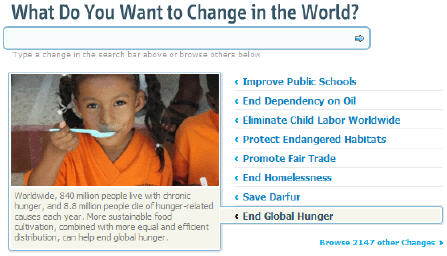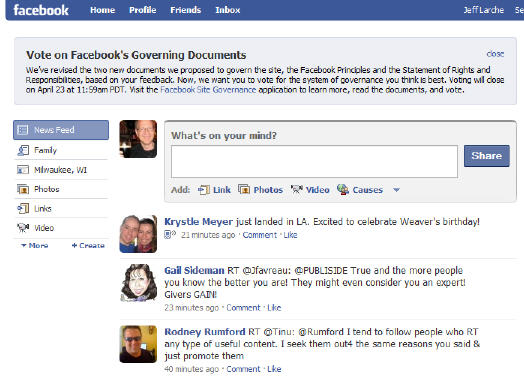There is change afoot at Change.org. This is a blogging site / portal that I’ve watched with great interest since I first decided to research the health of Community in this digital era. Change.org has a bold name and a mission to match. That’s a lot of pressure. So a few weeks ago, the organization announced the hiring of a new associate editor, Joshua Levy.
Levy will lead — for lack of a better word — dozens of bloggers who can pool their knowledge and opinions to inspire and facilitate change. Says a Wired piece on the hire (the link is immediately above), “The project [asks] a large number of busy people to contribute small chunks of time to volunteer — just as Wikipedia does.” I found the announcement heartening because it implied a new type of leadership.

That announcement coincided with Barack Obama achieving presumptive Democratic Presidential nominee status, a development that some say signals the death of top-down leadership in national political campaigns. Senator Obama’s campaign followed a horizontal, networked organization, while Senator Clinton’s used a more traditional hierarchical leadership style.
Both developments — as signs of a greater tend — give me hope.
Networked Leadership
Call me an optimist. When I was in my 20s, one of my favorite magazines was Utne Reader. Often called the Reader’s Digest of the alternative press, the Utne not only reported on positive social change but devoted precious resources to encouraging it. Significantly, it reported on the digital revolution, but also took a leadership position in exploring how networks can be used to revolutionize both print and activism. The publication’s prized, four-character (UTNE.com) domain name length is evidence of their early and enthusiastic arrival to the web.
The Utne also recognized the problems that Robert Putnam wrote about in Bowling Alone (the title comes from his observation that nearly every form of civic organization has fallen in membership and participation — whereas more people are bowling than 40 years ago, fewer are bowling in leagues).
The magazine’s response was to encourage neighborhood salons, constructed around the then-burgeoning communitarian movement. Utne realized that our nation’s social capital was shrinking, and attempted a crude (and alas, unsustainable) mail-and-fax infrastructure to support these grassroots salons.
I’m an optimist, but experience has taught me to temper it with realism.
Take the experience of watching the Utne-driven salon movement wither and die. Of course, this was before everyone and his brother seems to have clamored online. Perhaps a “real” network will provide the instant connections (not hindered by the U.S. Postal Mail) that were lacking two decades ago. Evidence of this is the vitality of sites like Change.org, and other online social networks that strive to do more with its membership than exchange banalities and wage Mob Warfare.
Exploring The Social Power of Networks
Earlier this month The Personal Democracy Forum (PDF) held its annual conference. Speakers debated, described and otherwise explored an aspect of a community voice that the PDF’s manifesto asserts is growing. Here is an excerpt of that manifesto (emphasis is at the end is mine):
Democracy in America is changing.
A new force, rooted in new tools and practices built on and around the Internet, is rising alongside the old system of capital-intensive broadcast politics.
Today, for almost no money, anyone can be a reporter, a community organizer, an ad-maker, a publisher, a money-raiser, or a leader.
If what they have to say is compelling, it will spread.
The cost of finding like-minded souls, banding together, and speaking to the powerful has dropped to almost zero.
Networked voices are reviving the civic conversation.
By some measures PDF is correct. New York Times editorial writer Nicholas Kristof, in his opinion piece Saving the World in Study Hall, provides some impressive anecdotal evidence that there is hope for us in the Millennial generation (those who were born in the 1980s and ’90s). And I do not doubt that there are individuals and small groups doing amazing things to make this world a better place.
But can this be “scaled?”
There’s a lot of work to be done, and my concern is online efforts are too little and too late.
Also, can this work be quantified, in the same, nearly irrefutable way that Bowling Alone quantified social capital’s depressing decline?
I’d welcome your thoughts.
In the meantime, I do think I have an answer for Bernard Sifry, father of PDF conference co-chair Micah Sifry. His parting question at the event: “How do we build leadership on the internet?” You find leaders who follow Lao Tzu’s advice in his famous Tao Te Ching:
The greatest leaders are never seen, their presence is never felt
Lesser rulers are loved and praised
Lesser still are hated, and obeyed through fear
And the least are despised and ignored
If you would lead people, trust them to do the right thing
When a leader accomplishes something using the tao
He steps back, moves on to something else
And lets the people praise themselves

